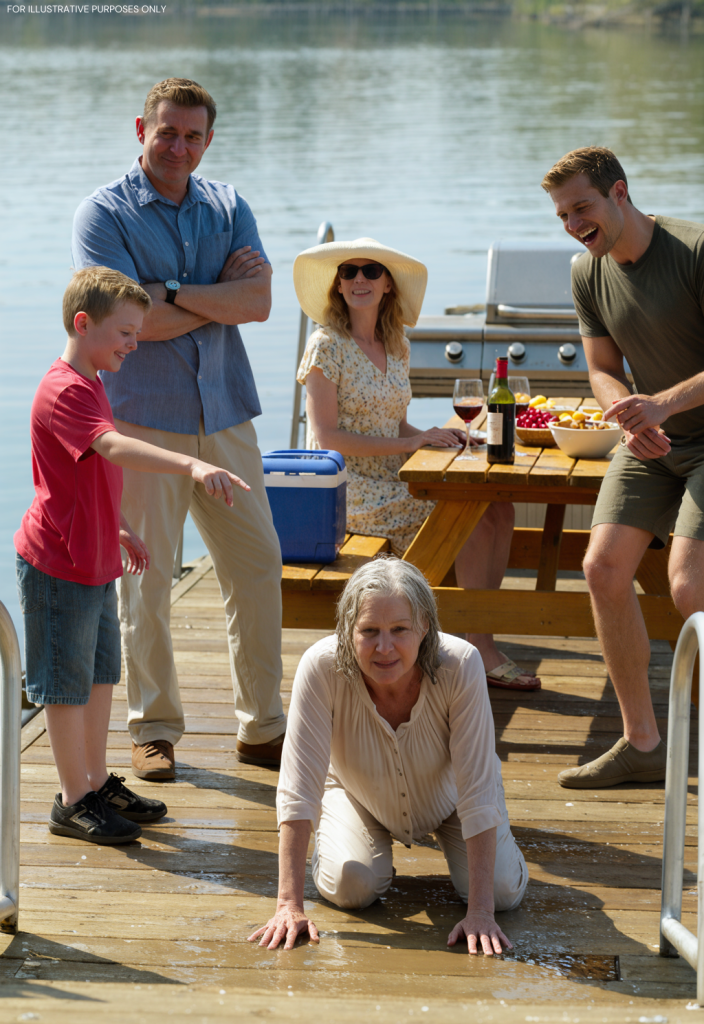I let them believe it. I pretended to be forgetful and weak so they would grow careless. I kept a record of every cutting word they spoke, every whisper plotting to make me invisible.

I never imagined a quiet family barbecue ending with me choking on cold lake water. It was Henri, my nineteen-year-old grandson, who pushed me. He stood on the dock with a grin that never reached his eyes, taunting, “Show us, Grandmère — can you still swim?”
Before I could respond, his hands shoved me, and the water hit me like ice. I hadn’t swum in years, not since my hip surgery. I tried to call for help, only to swallow mouthfuls of lake water as my arms flailed uselessly. Laughter rang out from above, sharp and cruel.
When I finally broke the surface, gasping, I saw them all. Henri doubled over with laughter, his friends jeering. My son Laurent stood stiff and silent. Sabine sipped her rosé, smiling, “She’s being dramatic again,” her voice carrying across the water.
Not a hand reached for me. By instinct, I dragged myself to the dock, knees scraped raw, shaking from cold and humiliation. Henri leaned close enough to sneer. “Stronger than you look. I thought you’d sink.” Their laughter followed me like a shadow as I returned to the house.
Inside, I stripped off my soaked clothes and stared at my reflection. Hair tangled, eyes red, skin blotchy from cold. Downstairs, they were already back to talking about vacation villas, as though nothing had happened. I felt invisible.
That night, I wrote in my journal: They will not have another chance to drown me.
The next morning, my friend Brigitte arrived, as she always did, bringing pastries and her unstoppable energy. She looked me over and said firmly, “Sit. Tell me everything.”
I told her. She listened, tension tightening her jaw at each detail. Then she set a folder on the table: her lawyer’s card, a detailed list of my accounts. “It’s time,” she said.
Days later, I sat with Monsieur Caron, the lawyer, handing him every document — including the education fund my late husband and I had saved for Henri. Fifty thousand euros, untouched since he was ten.
“What do you want to do with it?” Caron asked.
“Not yet,” I said. “I want to watch how they act when they think I’m fading.”
Thus began my quiet performance. I let my hands tremble while pouring tea. I let words falter mid-sentence, pretending memory failed me. Whispers followed. Laurent warned Sabine I was declining. Sabine fretted about forgotten stoves. Henri dismissed me with grunts. I recorded it all, while secretly keeping my finances untouched. They believed they were plotting my removal to a care home. In truth, I was waiting for their greed to reveal itself fully.
It happened at one of Sabine’s dinner parties. From the kitchen, I overheard Henri recount the lake incident, exaggerating my flailing to make the guests laugh. Sabine leaned to a friend and whispered, “She’s a liability. We need to consider the future.”
That night, I called Caron. “I’m ready,” I said.
The next morning, I transferred the entire university fund to a scholarship foundation in Geneva, in memory of my husband, a gift to education rather than entitlement. I bought a one-way ticket to Bellecombe, where Brigitte kept her cottage.
When I told my family I was leaving for the weekend, they barely noticed. Laurent scrolled his phone. Henri brushed past. Sabine mumbled a distracted farewell.
I left at dawn. Five days later, they received my letter: You laughed while I drowned. My love is not currency. I will no longer support cruelty. This is not revenge — it is freedom.
They panicked. They tried to find me, even claimed I was missing, until Caron proved I was of sound mind. I later heard Henri dropped out of school, Laurent turned to drink, and Sabine complained endlessly. Without my support, their carefully maintained facade crumbled.
As for me, I live in Bellecombe now. I tend my garden, play chess with neighbors, and walk quiet streets where no one questions my worth. They thought they had erased me. In reality, I erased them.